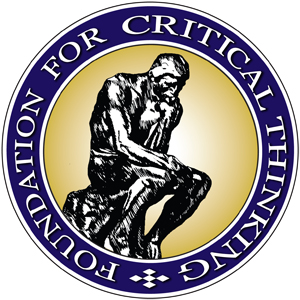
Many of our resources, publications, and materials are applicable to all professions and across all domains of thought. We do, however, recognize that the depth and breadth of content we offer may be daunting. We have therefore created the following pages as starting points for your studies.
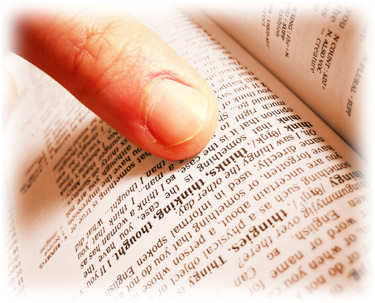
If you are new to critical thinking or wish to deepen your conception of it, we recommend you review the content below and bookmark this page for future reference.
{"id":"2268","title":"","author":"","content":"<p><span><br /> Many of our resources, publications, and materials are applicable to all professions and across all domains of thought. We do, however, recognize that the depth and breadth of content we offer may be daunting. We have therefore created the following pages as starting points for your studies.<br /> </span><br /> <img style=\"float: right; margin-left: 10px; margin-right: 10px; margin-top: 5px; margin-bottom: 5px;\" src=\"/image/pimage/define_thinking.jpg\" alt=\"\" width=\"309\" height=\"250\" /></p>\r\n<ul>\r\n<li style=\"margin-bottom: 6px;\"> <strong><a href=\"https://www.criticalthinking.org/starting/higher_ed.cfm\">For College and University Faculty</a></strong></li>\r\n<li style=\"margin-bottom: 6px;\"><strong> <a href=\"https://www.criticalthinking.org/starting/college_student.cfm\">For College and University Students</a></strong></li>\r\n<li style=\"margin-bottom: 6px;\"><strong> <a href=\"https://www.criticalthinking.org/starting/High_School.cfm\">For High School Teachers</a></strong></li>\r\n<li style=\"margin-bottom: 6px;\"><strong> <a href=\"https://www.criticalthinking.org/starting/Jr_High.cfm\">For Jr. High School Teachers</a></strong></li>\r\n<li style=\"margin-bottom: 6px;\"><strong> <a href=\"https://www.criticalthinking.org/starting/elem_Grades4-6.cfm\">For Elementary Teachers (Grades 4-6)</a></strong></li>\r\n<li style=\"margin-bottom: 6px;\"><strong> <a href=\"https://www.criticalthinking.org/starting/elementary.cfm\">For Elementary Teachers (Kindergarten - 3rd Grade)</a></strong></li>\r\n<li style=\"margin-bottom: 6px;\"><strong> <a href=\"https://www.criticalthinking.org/starting/science_engineer.cfm\">For Science and Engineering Instruction</a></strong></li>\r\n<li style=\"margin-bottom: 6px;\"><strong> <a href=\"https://www.criticalthinking.org/starting/business.cfm\">For Business and Professional Development</a></strong></li>\r\n<li style=\"margin-bottom: 6px;\"><strong> <a href=\"https://www.criticalthinking.org/starting/nurse_health.cfm\">For Nursing and Health Care</a></strong></li>\r\n<li style=\"margin-bottom: 6px;\"><strong> </strong><strong><a href=\"https://www.criticalthinking.org/starting/home_school.cfm\">For Home Schooling and Home Study</a></strong><strong><a href=\"https://www.criticalthinking.org/starting/home_school.cfm\"></a></strong><span style=\"text-decoration: underline;\"><strong><a href=\"https://www.criticalthinking.org/starting/home_school.cfm\"><br /> </a></strong></span></li>\r\n</ul>\r\n<p><br />If you are new to critical thinking or wish to deepen your conception of it, we recommend you review the content below and bookmark this page for future reference.</p>","public_access":"1","public_downloads":"1","sku":"","files":[],"images":[]}
Our Conception of Critical Thinking...
There are many ways to articulate the concept of critical thinking, yet every substantive conception must contain certain core elements. Consider these brief conceptualizations of critical thinking...

"Critical thinking is the intellectually disciplined process of actively and skillfully conceptualizing, applying, analyzing, synthesizing, and/or evaluating information gathered from, or generated by, observation, experience, reflection, reasoning, or communication, as a guide to belief and action. In its exemplary form, it is based on universal intellectual values that transcend subject matter divisions: clarity, accuracy, precision, consistency, relevance, sound evidence, good reasons, depth, breadth, and fairness..."
"Critical thinking is self-guided, self-disciplined thinking which attempts to reason at the highest level of quality in a fairminded way. People who think critically attempt, with consistent and conscious effort, to live rationally, reasonably, and empathically. They are keenly aware of the inherently flawed nature of human thinking when left unchecked. They strive to diminish the power of their egocentric and sociocentric tendencies. They use the intellectual tools that critical thinking offers – concepts and principles that enable them to analyze, assess, and improve thinking. They work diligently to develop the intellectual virtues of intellectual integrity, intellectual humility, intellectual civility, intellectual empathy, intellectual sense of justice and confidence in reason. They realize that no matter how skilled they are as thinkers, they can always improve their reasoning abilities and they will at times fall prey to mistakes in reasoning, human irrationality, prejudices, biases, distortions, uncritically accepted social rules and taboos, self-interest, and vested interest.
They strive to improve the world in whatever ways they can and contribute to a more rational, civilized society. At the same time, they recognize the complexities often inherent in doing so. They strive never to think simplistically about complicated issues and always to consider the rights and needs of relevant others. They recognize the complexities in developing as thinkers, and commit themselves to life-long practice toward self-improvement. They embody the Socratic principle: The unexamined life is not worth living, because they realize that many unexamined lives together result in an uncritical, unjust, dangerous world."
~ Linda Elder, September, 2007
{"id":"2269","title":"Our Conception of Critical Thinking...","author":"","content":"<p>There are many ways to articulate the concept of critical thinking, yet every substantive conception must contain certain core elements. Consider these brief conceptualizations of critical thinking...<br /> <img style=\"float: left; margin: 8px 14px;\" src=\"https://www.criticalthinking.org/image/pimage/Library-stack1.jpg\" alt=\"getting started with critical thinking\" /></p>\r\n<p>\"Critical thinking is the intellectually disciplined process of actively and skillfully conceptualizing, applying, analyzing, synthesizing, and/or evaluating information gathered from, or generated by, observation, experience, reflection, reasoning, or communication, as a guide to belief and action. In its exemplary form, it is based on universal intellectual values that transcend subject matter divisions: clarity, accuracy, precision, consistency, relevance, sound evidence, good reasons, depth, breadth, and fairness...\"</p>\r\n<div>~ A statement by Michael Scriven & Richard Paul, presented at the 8th Annual International Conference on Critical Thinking and Education Reform, 1987. <span style=\"text-decoration: underline;\"><strong><a href=\"https://www.criticalthinking.org/aboutCT/define_critical_thinking.cfm\">(Click here for a more complete version.)</a></strong></span></div>\r\n<p><br /><br /> \"Critical thinking is self-guided, self-disciplined thinking which attempts to reason at the highest level of quality in a fairminded way. People who think critically attempt, with consistent and conscious effort, to live rationally, reasonably, and empathically. They are keenly aware of the inherently flawed nature of human thinking when left unchecked. They strive to diminish the power of their egocentric and sociocentric tendencies. They use the intellectual tools that critical thinking offers – concepts and principles that enable them to analyze, assess, and improve thinking. They work diligently to develop the intellectual virtues of intellectual integrity, intellectual humility, intellectual civility, intellectual empathy, intellectual sense of justice and confidence in reason. They realize that no matter how skilled they are as thinkers, they can always improve their reasoning abilities and they will at times fall prey to mistakes in reasoning, human irrationality, prejudices, biases, distortions, uncritically accepted social rules and taboos, self-interest, and vested interest.</p>\r\n<p>They strive to improve the world in whatever ways they can and contribute to a more rational, civilized society. At the same time, they recognize the complexities often inherent in doing so. They strive never to think simplistically about complicated issues and always to consider the rights and needs of relevant others. They recognize the complexities in developing as thinkers, and commit themselves to life-long practice toward self-improvement. They embody the Socratic principle: <em>The unexamined life is not worth living</em>, because they realize that many unexamined lives together result in an uncritical, unjust, dangerous world.\"</p>\r\n<div>~ Linda Elder, September, 2007</div>","public_access":"1","public_downloads":"1","sku":"","files":[],"images":[]}
Why Critical Thinking?
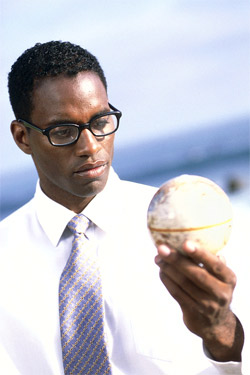
The Problem:
Everyone thinks; it is our nature to do so. But much of our thinking, left to itself, is biased, distorted, partial, uninformed, or down-right prejudiced. Yet the quality of our lives and that of what we produce, make, or build depends precisely on the quality of our thought. Shoddy thinking is costly, both in money and in quality of life. Excellence in thought, however, must be systematically cultivated.
A Brief Definition:
Critical thinking is the art of analyzing and evaluating thinking with a view to improving it.
The Result:
A well-cultivated critical thinker:
- raises vital questions and problems, formulating them clearly and precisely;
- gathers and assesses relevant information, using abstract ideas to interpret it effectively;
- comes to well-reasoned conclusions and solutions, testing them against relevant criteria and standards;
- thinks openmindedly within alternative systems of thought, recognizing and assessing, as need be, their assumptions, implications, and practical consequences; and
- communicates effectively with others in figuring out solutions to complex problems.
Critical thinking is, in short, self-directed, self-disciplined, self-monitored, and self-corrective thinking. It requires rigorous standards of excellence and mindful command of their use. It entails effective communication and problem-solving abilities, and a commitment to overcoming our native egocentrism and sociocentrism.
Read more about our concept of critical thinking.
{"id":"2270","title":"Why Critical Thinking?","author":"","content":"<p><img style=\"float: right;\" src=\"/image/pimage/Thinking-Man1.jpg\" alt=\"\" /></p>\r\n<p><strong>The Problem:</strong></p>\r\n<p>Everyone thinks; it is our nature to do so. But much of our thinking, left to itself, is biased, distorted, partial, uninformed, or down-right prejudiced. Yet the quality of our lives and that of what we produce, make, or build depends precisely on the quality of our thought. Shoddy thinking is costly, both in money and in quality of life. Excellence in thought, however, must be systematically cultivated.</p>\r\n<p><strong>A Brief Definition:</strong></p>\r\n<p>Critical thinking is the art of analyzing and evaluating thinking with a view to improving it.<br /> <br /><strong>The Result: </strong></p>\r\n<p><strong> </strong>A well-cultivated critical thinker:</p>\r\n<ul>\r\n<li>raises vital questions and problems, formulating them clearly and precisely;</li>\r\n<li>gathers and assesses relevant information, using abstract ideas to interpret it effectively;</li>\r\n<li>comes to well-reasoned conclusions and solutions, testing them against relevant criteria and standards;</li>\r\n<li>thinks openmindedly within alternative systems of thought, recognizing and assessing, as need be, their assumptions, implications, and practical consequences; and</li>\r\n<li>communicates effectively with others in figuring out solutions to complex problems.</li>\r\n</ul>\r\n<p>Critical thinking is, in short, self-directed, self-disciplined, self-monitored, and self-corrective thinking. It requires rigorous standards of excellence and mindful command of their use. It entails effective communication and problem-solving abilities, and a commitment to overcoming our native egocentrism and sociocentrism.<br /><br /> <strong><span style=\"text-decoration: underline;\"><a href=\"https://www.criticalthinking.org/aboutCT/ourConceptCT.cfm\">Read more about our concept of critical thinking</a></span>.</strong></p>","public_access":"1","public_downloads":"1","sku":"","files":[],"images":[]}
The Essential Dimensions of Critical Thinking
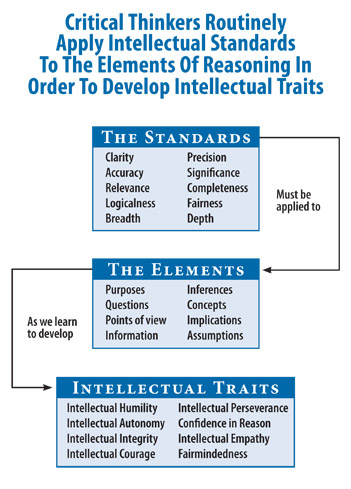
Our conception of critical thinking is based on the substantive approach developed by Dr. Richard Paul and his colleagues at the Center and Foundation for Critical Thinking over multiple decades. It is relevant to every subject, discipline, and profession, and to reasoning through the problems of everyday life. It entails five essential dimensions of critical thinking:
- The analysis of thought.
- The assessment of thought.
- The dispositions of thought.
- The skills and abilities of thought.
- The obstacles or barriers to critical thought.
|
At the left is an overview of the first three dimensions. In sum, the elements or structures of thought enable us to "take our thinking apart" and analyze it. The intellectual standards are used to assess and evaluate the elements. The intellectual traits are dispositions of mind embodied by the fairminded critical thinker. To cultivate the mind, we need command of these essential dimensions, and we need to consistently apply them as we think through the many problems and issues in our lives.
{"id":"2271","title":"The Essential Dimensions of Critical Thinking","author":"","content":"<p><img style=\"float: left;\" src=\"/image/pimage/Standards-Elems-Traits.jpg\" alt=\"\" /></p>\r\n<p>Our conception of critical thinking is based on the <strong><a href=\"https://www.criticalthinking.org/professionalDev/the-state-ct-today.cfm\">substantive approach</a> </strong>developed by Dr. Richard Paul and his colleagues at the Center and Foundation for Critical Thinking over multiple decades. It is relevant to every subject, discipline, and profession, and to reasoning through the problems of everyday life. It entails five essential dimensions of critical thinking:</p>\r\n<table>\r\n<tbody>\r\n<tr>\r\n<td><ol>\r\n<li>The analysis of thought.</li>\r\n<li>The assessment of thought.</li>\r\n<li>The dispositions of thought.</li>\r\n<li>The skills and abilities of thought.</li>\r\n<li>The obstacles or barriers to critical thought.</li>\r\n</ol></td>\r\n</tr>\r\n</tbody>\r\n</table>\r\n<p>At the left is an overview of the first three dimensions. In sum, the elements or structures of thought enable us to \"take our thinking apart\" and analyze it. The intellectual standards are used to assess and evaluate the elements. The intellectual traits are dispositions of mind embodied by the fairminded critical thinker. To cultivate the mind, we need command of these essential dimensions, and we need to consistently apply them as we think through the many problems and issues in our lives.</p>\r\n<p> </p>","public_access":"1","public_downloads":"1","sku":"","files":[],"images":[]}
The Elements of Reasoning and Intellectual Standards
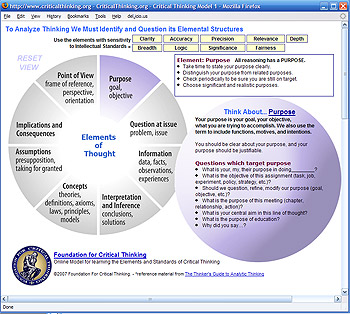
To learn more about the elements of thought and how to apply the intellectual standards, check out our interactive model. Simply click on the link below, scroll to the bottom of the page, and explore the model with your mouse.
Why the Analysis of Thinking Is Important
If you want to think well, you must understand at least the rudiments of thought, the most basic structures out of which all thinking is made. You must learn how to take thinking apart.
Analyzing the Logic of a Subject
When we understand the elements of reasoning, we realize that all subjects, all disciplines, have a fundamental logic defined by the structures of thought embedded within them. Therefore, to lay bare a subject’s most fundamental logic, we should begin with these questions:
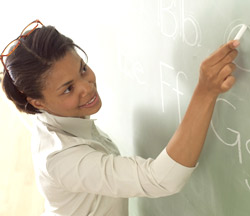
- What is the main purpose or goal of studying this subject? What are people in this field trying to accomplish?
- What kinds of questions do they ask? What kinds of problems do they try to solve?
- What sorts of information or data do they gather?
- What types of inferences do they usually draw? What types of judgments do they typically make? (Judgments about…)
- How do they go about gathering information in ways that are distinctive to this field?
- What are the most basic ideas, concepts, or theories in this field?
- What do professionals in this field take for granted or assume?
- How should studying this field affect my view of the world?
- What viewpoint is fostered in this field?
- What implications follow from studying this discipline? How are the products of this field used in everyday life? How might they be used in ways they are not currently?
|
{"id":"2272","title":"The Elements of Reasoning and Intellectual Standards","author":"","content":"<p><img style=\"float: right;\" src=\"https://www.criticalthinking.org/image/pimage/CTModel1-starter.jpg\" alt=\"\" /></p>\r\n<p><span><br /> To learn more about the elements of thought and how to apply the intellectual standards, check out our interactive model. Simply click on the link below, scroll to the bottom of the page, and explore the model with your mouse.</span><span><br /> <br /> </span></p>\r\n<div><a href=\"https://community.criticalthinking.org/wheelOfReason.php\" target=\"_blank\"><span style=\"text-decoration: underline;\"><strong><span style=\"font-weight: bold;\">Open the \"Elements and Standards\" Online Learning </span><span style=\"font-weight: bold;\">Model.</span></strong></span></a></div>\r\n<p><br /> <span><span style=\"color: #000080;\"><strong>Why the Analysis of Thinking Is Important<br /> </strong></span><br /> </span>If you want to think well, you must understand at least the rudiments of thought, the most basic structures out of which all thinking is made. You must learn how to take thinking apart.<br /> <br /> <span style=\"color: #000080;\"><strong>Analyzing the Logic of a Subject<br /><br /></strong></span>When we understand the elements of reasoning, we realize that all subjects, all disciplines, have a fundamental logic defined by the structures of thought embedded within them. Therefore, to lay bare a subject’s most fundamental logic, we should begin with these questions:</p>\r\n<p><img src=\"https://www.criticalthinking.org/image/pimage/Woman-chalkboard.jpg\" border=\"0\" alt=\"\" hspace=\"10\" vspace=\"8\" align=\"left\" /></p>\r\n<table>\r\n<tbody>\r\n<tr>\r\n<td>\r\n<ul>\r\n<li> What is the main purpose or goal of studying this subject? What are people in this field trying to accomplish?</li>\r\n<li> What kinds of questions do they ask? What kinds of problems do they try to solve?</li>\r\n<li> What sorts of information or data do they gather?</li>\r\n<li> What types of inferences do they usually draw? What types of judgments do they typically make? (Judgments about…)</li>\r\n<li> How do they go about gathering information in ways that are distinctive to this field?</li>\r\n<li> What are the most basic ideas, concepts, or theories in this field?</li>\r\n<li> What do professionals in this field take for granted or assume?</li>\r\n<li> How should studying this field affect my view of the world?</li>\r\n<li> What viewpoint is fostered in this field?</li>\r\n<li> What implications follow from studying this discipline? How are the products of this field used in everyday life? How might they be used in ways they are not currently?</li>\r\n</ul>\r\n</td>\r\n</tr>\r\n</tbody>\r\n</table>","public_access":"1","public_downloads":"1","sku":"","files":[],"images":[]}
Going Deeper...
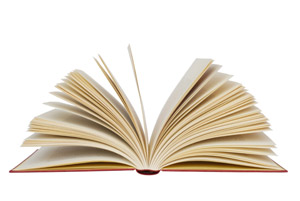
While most critical thinking concepts are intuitive, to integrate and apply these concepts consistently and rationally takes concerted effort, study, and reflection. Just as professional athletes or musicians must practice to master their sport or art, so too must thinkers practice to master their minds. We invite you to return to our website often and explore the resources available to assist you in developing and cultivating your thinking.
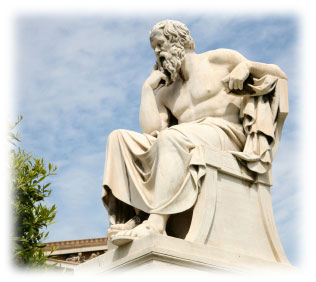
The Critical Thinking Bookstore
Our online bookstore houses numerous books and teacher's manuals, Thinker's Guides, videos, and other educational materials.
Learn From Our Fellows and Scholars
Watch our Event Calendar, which provides an overview of all upcoming conferences and academies hosted by the Foundation for Critical Thinking. Clicking an entry on the Event Calendar will bring up that event's details, and the option to register.
For those interested in online learning, the Foundation offers accredited online courses in critical thinking for both educators and the general public, as well as an online test for evaluating basic comprehension of critical thinking concepts. We are in the process of developing more online learning tools and tests to offer the community.
Utilizing this Website
This website contains large amounts research and an online library of articles, both of which are freely available to the public. We also invite you to become a member of the Critical Thinking Community, where you will gain access to more tools and materials. If you cannot locate a resource on a specific topic or concept, try searching for it using our Search Tool. The Search Tool is at the upper-right of every page on the website.
{"id":"2273","title":"Going Deeper...","author":"","content":"<p><img style=\"float: right;\" src=\"https://www.criticalthinking.org/image/pimage/iStock_book.jpg\" alt=\"\" /><br /> <span>While most critical thinking concepts are intuitive, to integrate and apply these concepts consistently and rationally takes concerted effort, study, and reflection. Just as professional athletes or musicians must practice to master their sport or art, so too must thinkers practice to master their minds. We invite you to return to our website often and explore the resources available to assist you in developing and cultivating your thinking. </span><br /> <br /> <a href=\"https://www.criticalthinking.org/bookstore/index.cfm\"><span style=\"color: #000080;\"><img src=\"https://www.criticalthinking.org/image/pimage/iStock_socrates3.jpg\" border=\"0\" alt=\"Join the Critical Thinking Community\" hspace=\"5\" vspace=\"8\" align=\"left\" /></span></a><span style=\"color: #000080;\"><strong><span> </span></strong></span></p>\r\n<p><span style=\"color: #000080;\"><strong style=\"color: #000080;\"><br />The Critical Thinking Bookstore</strong></span><span><span style=\"text-decoration: underline;\"><strong> </strong></span></span></p>\r\n<p><span><strong><a href=\"https://www.criticalthinking.org/bookstore/index.cfm\">Our online bookstore</a></strong> houses numerous <strong><a href=\"https://www.criticalthinking.org/store/catalogs/books/214\">books and teacher's manuals</a></strong>, <strong><a href=\"https://www.criticalthinking.org/store/catalogs/thinkers-guides/224\">Thinker's Guides</a></strong>, <strong><a href=\"https://www.criticalthinking.org/store/catalogs/videos/215\">videos</a></strong>, and other <strong><a href=\"https://www.criticalthinking.org/store/catalogs/materials/217\">educational materials</a></strong>.</span><span style=\"color: #000080;\"><strong style=\"color: #000080;\"> </strong></span></p>\r\n<p> </p>\r\n<p><span style=\"color: #000080;\"><strong style=\"color: #000080;\">Learn From Our Fellows and Scholars</strong></span><span> <br /></span></p>\r\n<p><span>Watch our <a href=\"https://www.criticalthinking.org/conference/index.cfm\"><strong>Event Calendar</strong></a>, which provides an overview of all upcoming conferences and academies hosted by the </span><span><span>Foundation for Critical Thinking.</span> Clicking an entry on the Event Calendar will bring up that event's details, and the option to register. <br /><br />For those interested in online learning, the Foundation offers <strong><a href=\"https://www.criticalthinking.org/pages/online-courses-for-instructors/574/\">accredited online courses in critical thinking</a></strong> for both educators and the general public, as well as an <strong><a href=\"https://www.criticalthinking.org/pages/online-critical-thinking-basic-concepts-test/679\">online test for evaluating basic comprehension of critical thinking concepts</a></strong>. We are in the process of developing more online learning tools and tests to offer the community.</span><span style=\"color: #000080;\"><strong> </strong></span></p>\r\n<p> </p>\r\n<p><span style=\"color: #000080;\"><strong>Utilizing this Website</strong></span></p>\r\n<p>This website contains large amounts <strong><a href=\"https://www.criticalthinking.org/research/index.cfm\">research</a></strong> and an <strong><a href=\"https://www.criticalthinking.org/pages/index-of-articles/1021/\">online library of articles</a></strong>, both of which are freely available to the public. We also invite you to become a member of the <strong><a href=\"https://www.criticalthinking.org/courses/OL_CT_Membership.cfm\">Critical Thinking Community</a></strong>, where you will gain access to more tools and materials. If you cannot locate a resource on a specific topic or concept, try searching for it using our <strong>Search Tool</strong>. The Search Tool is at the upper-right of every page on the website.<br style=\"clear: both;\" /></p>","public_access":"1","public_downloads":"1","sku":"","files":[],"images":[]}









